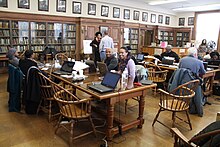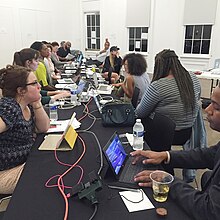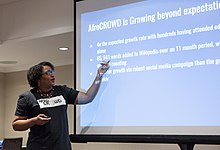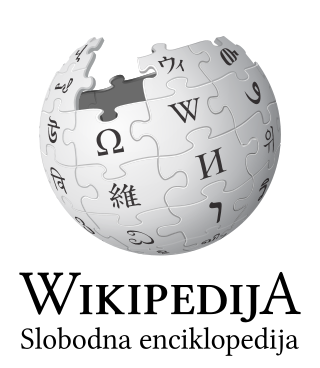
The Croatian Wikipedia is the Croatian language version of Wikipedia, the free encyclopedia, started on February 16, 2003. This version has 219,902 articles and a total of 6.88 million edits have been made. It has 310,446 registered users, out of which 487 have been active in the last 30 days, and 13 administrators. Throughout 2014, fewer than two dozen editors made more than 100 edits a month; around 150 made more than 5 edits a month. Around 750 articles are ranked as featured.

The free online encyclopedia Wikipedia has been criticized since its creation in 2001. Most of the criticism has been directed toward its content, community of established volunteer users, process, and rules. Critics have questioned its factual reliability, the readability and organization of its articles, the lack of methodical fact-checking, and its political bias. Concerns have also been raised about systemic bias along gender, racial, political, corporate, institutional, and national lines. Conflicts of interest arising from corporate campaigns to influence content have also been highlighted. Further concerns include the vandalism and partisanship facilitated by anonymous editing, clique behavior, social stratification between a guardian class and newer users, excessive rule-making, edit warring, and uneven policy application.
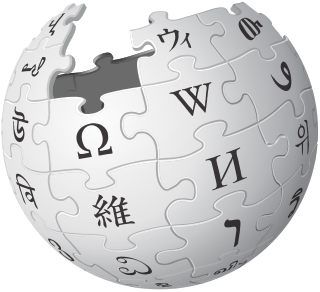
Wikipedia is a free content online encyclopedia written and maintained by a community of volunteers, known as Wikipedians, through open collaboration and the use of the wiki-based editing system MediaWiki. Wikipedia is the largest and most-read reference work in history. It is consistently ranked as one of the ten most popular websites in the world, and as of 2024 is ranked the fifth most visited website on the Internet by Semrush. Founded by Jimmy Wales and Larry Sanger on January 15, 2001, Wikipedia is hosted by the Wikimedia Foundation, an American nonprofit organization that employs a staff of over 700 people.

The reliability of Wikipedia and its user-generated editing model, particularly its English-language edition, has been questioned and tested. Wikipedia is written and edited by volunteer editors who generate online content with the editorial oversight of other volunteer editors via community-generated policies and guidelines. The reliability of the project has been tested statistically through comparative review, analysis of the historical patterns, and strengths and weaknesses inherent in its editing process. The online encyclopedia has been criticized for its factual unreliability, principally regarding its content, presentation, and editorial processes. Studies and surveys attempting to gauge the reliability of Wikipedia have mixed results. Wikipedia's reliability was frequently criticized in the 2000s but has been improved; it has been generally praised in the late 2010s and early 2020s.
Washington Summit Publishers (WSP) is a white nationalist publisher based in Augusta, Georgia, which produces and sells books on race and intelligence and related topics. The company is run by white supremacist Richard B. Spencer, who also ran the defunct white supremacist National Policy Institute.
Wikipedia has been studied extensively. Between 2001 and 2010, researchers published at least 1,746 peer-reviewed articles about the online encyclopedia. Such studies are greatly facilitated by the fact that Wikipedia's database can be downloaded without help from the site owner.
Deletionism and inclusionism are opposing philosophies that largely developed within the community of editors of the online encyclopedia Wikipedia. The terms reflect differing opinions on the appropriate scope of the encyclopedia and corresponding tendencies either to delete or to include a given encyclopedia article.
In the English version of the online encyclopedia Wikipedia, notability is a criterion to determine whether a topic merits a separate Wikipedia article. It is described in the guideline "Wikipedia:Notability". In general, notability is an attempt to assess whether the topic has "gained sufficiently significant attention by the world at large and over a period of time" as evidenced by significant coverage in reliable secondary sources that are independent of the topic". The notability guideline was introduced in 2006 and has since been subject to various controversies.

The Wikipedia community, collectively and individually known as Wikipedians, is an online community of volunteers who create and maintain Wikipedia, an online encyclopedia. Since August 2012, the word "Wikipedian" has been an Oxford Dictionary entry.

The following outline is provided as an overview of and a topical guide to Wikipedia:

An edit-a-thon is an event where some editors of online communities such as Wikipedia, OpenStreetMap, and LocalWiki edit and improve a specific topic or type of content. The events typically include basic editing training for new editors and may be combined with a more general social meetup. The word is a portmanteau of "edit" and "marathon". An edit-a-thon can either be "in-person" or online or a blended version of both. If it is not in-person, it is usually called a "virtual edit-a-thon" or "online edit-a-thon".

Gender bias on Wikipedia is a term used to describe various gender-related disparities on Wikipedia, particularly the overrepresentation of men among both volunteer contributors and article subjects, as well as lesser coverage of and topics primarily of interest to women.

Art and Feminism is an annual worldwide edit-a-thon to add content to Wikipedia about women artists, which started in 2014. The project has been described as "a massive multinational effort to correct a persistent bias in Wikipedia, which is disproportionately written by and about men".

Women in Red is a WikiProject addressing the current gender bias in Wikipedia content. The project focuses on creating content regarding women's biographies, women's works, and women's issues.
Perceived ideological bias on Wikipedia, especially on its English-language edition, has been the subject of academic analysis and public criticism of the project. Questions relate to whether its content is biased due to the political, religious, or other ideologies its volunteer editors may adhere to. These all draw concerns as to the possible effects this may have on the encyclopedia's reliability.
Wiki Loves Pride is a campaign to improve LGBT-related content on Wikipedia and other projects in the Wikimedia movement.

The Black Lunch Table (BLT) is a United States-based oral-history archiving project founded in 2005, focused on the lives and work of Black artists. Its work includes oral archiving, salons, peer teaching workshops, meetups, and Wikipedia edit-a-thons. The BLT brings people together to engage in dialogues about the writing, recording, and promoting inclusive art history. One of its aims is to address the racial and gender bias on Wikipedia by encouraging Wikipedia articles about African-American artists.
Coverage of American politics in Wikipedia is a subject that has received substantial attention from the media. Since its founding in 2001, Wikipedia has provided coverage of five United States presidential elections, and six mid-term elections at the federal level, as well as numerous "off-year" state elections and special elections.
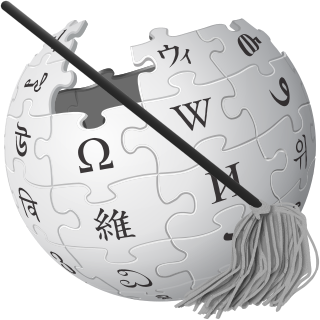
Volunteer editors of Wikipedia delete articles from the online encyclopedia regularly, following processes that have been formulated by the site's community over time. The most common route is the outright deletion of articles that clearly violate the rules of the website. Other mechanisms include an intermediate collaborative process that bypasses a complete discussion, and a whole debate at the dedicated forum called Articles for deletion (AfD). As a technical action, deletion can only be done by a subset of editors assigned particular specialized privileges by the community, called administrators. An omission that has been carried out can be contested by appeal to the deleting administrator or on another discussion board called Deletion review (DRV).

Jason Moore is an American Wikipedia editor among the English Wikipedia's most active contributors by edit count. Editing since 2007 as "Another Believer", he has specialized in current events, with coverage including the COVID-19 pandemic, George Floyd protests, and the culture of Portland, Oregon, where he is based. On Wikipedia, Moore has created and developed editor affinity groups for joint work on these topics. As an organizer in the Wikimedia movement, Moore has hosted meet-ups and edit-a-thons to train new editors.
